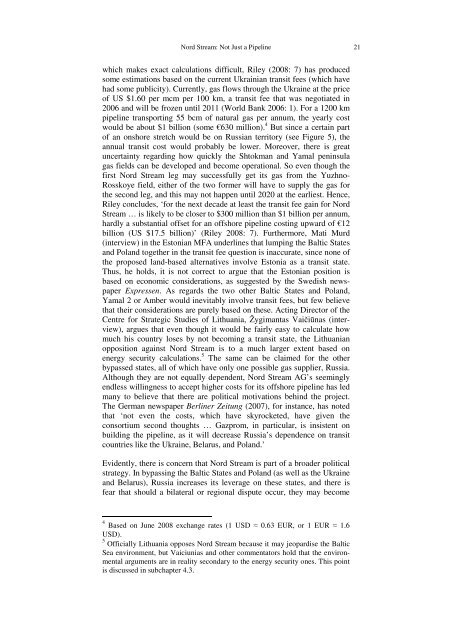Nord Stream: Not Just a Pipeline
Nord Stream: Not Just a Pipeline
Nord Stream: Not Just a Pipeline
Create successful ePaper yourself
Turn your PDF publications into a flip-book with our unique Google optimized e-Paper software.
<strong>Nord</strong> <strong>Stream</strong>: <strong>Not</strong> <strong>Just</strong> a <strong>Pipeline</strong> 21<br />
which makes exact calculations difficult, Riley (2008: 7) has produced<br />
some estimations based on the current Ukrainian transit fees (which have<br />
had some publicity). Currently, gas flows through the Ukraine at the price<br />
of US $1.60 per mcm per 100 km, a transit fee that was negotiated in<br />
2006 and will be frozen until 2011 (World Bank 2006: 1). For a 1200 km<br />
pipeline transporting 55 bcm of natural gas per annum, the yearly cost<br />
would be about $1 billion (some €630 million). 4 But since a certain part<br />
of an onshore stretch would be on Russian territory (see Figure 5), the<br />
annual transit cost would probably be lower. Moreover, there is great<br />
uncertainty regarding how quickly the Shtokman and Yamal peninsula<br />
gas fields can be developed and become operational. So even though the<br />
first <strong>Nord</strong> <strong>Stream</strong> leg may successfully get its gas from the Yuzhno-<br />
Rosskoye field, either of the two former will have to supply the gas for<br />
the second leg, and this may not happen until 2020 at the earliest. Hence,<br />
Riley concludes, ‘for the next decade at least the transit fee gain for <strong>Nord</strong><br />
<strong>Stream</strong> … is likely to be closer to $300 million than $1 billion per annum,<br />
hardly a substantial offset for an offshore pipeline costing upward of €12<br />
billion (US $17.5 billion)’ (Riley 2008: 7). Furthermore, Mati Murd<br />
(interview) in the Estonian MFA underlines that lumping the Baltic States<br />
and Poland together in the transit fee question is inaccurate, since none of<br />
the proposed land-based alternatives involve Estonia as a transit state.<br />
Thus, he holds, it is not correct to argue that the Estonian position is<br />
based on economic considerations, as suggested by the Swedish newspaper<br />
Expressen. As regards the two other Baltic States and Poland,<br />
Yamal 2 or Amber would inevitably involve transit fees, but few believe<br />
that their considerations are purely based on these. Acting Director of the<br />
Centre for Strategic Studies of Lithuania, Žygimantas Vaičiūnas (interview),<br />
argues that even though it would be fairly easy to calculate how<br />
much his country loses by not becoming a transit state, the Lithuanian<br />
opposition against <strong>Nord</strong> <strong>Stream</strong> is to a much larger extent based on<br />
energy security calculations. 5 The same can be claimed for the other<br />
bypassed states, all of which have only one possible gas supplier, Russia.<br />
Although they are not equally dependent, <strong>Nord</strong> <strong>Stream</strong> AG’s seemingly<br />
endless willingness to accept higher costs for its offshore pipeline has led<br />
many to believe that there are political motivations behind the project.<br />
The German newspaper Berliner Zeitung (2007), for instance, has noted<br />
that ‘not even the costs, which have skyrocketed, have given the<br />
consortium second thoughts … Gazprom, in particular, is insistent on<br />
building the pipeline, as it will decrease Russia’s dependence on transit<br />
countries like the Ukraine, Belarus, and Poland.’<br />
Evidently, there is concern that <strong>Nord</strong> <strong>Stream</strong> is part of a broader political<br />
strategy. In bypassing the Baltic States and Poland (as well as the Ukraine<br />
and Belarus), Russia increases its leverage on these states, and there is<br />
fear that should a bilateral or regional dispute occur, they may become<br />
4<br />
Based on June 2008 exchange rates (1 USD ≈ 0.63 EUR, or 1 EUR ≈ 1.6<br />
USD).<br />
5<br />
Officially Lithuania opposes <strong>Nord</strong> <strong>Stream</strong> because it may jeopardise the Baltic<br />
Sea environment, but Vaiciunias and other commentators hold that the environmental<br />
arguments are in reality secondary to the energy security ones. This point<br />
is discussed in subchapter 4.3.













